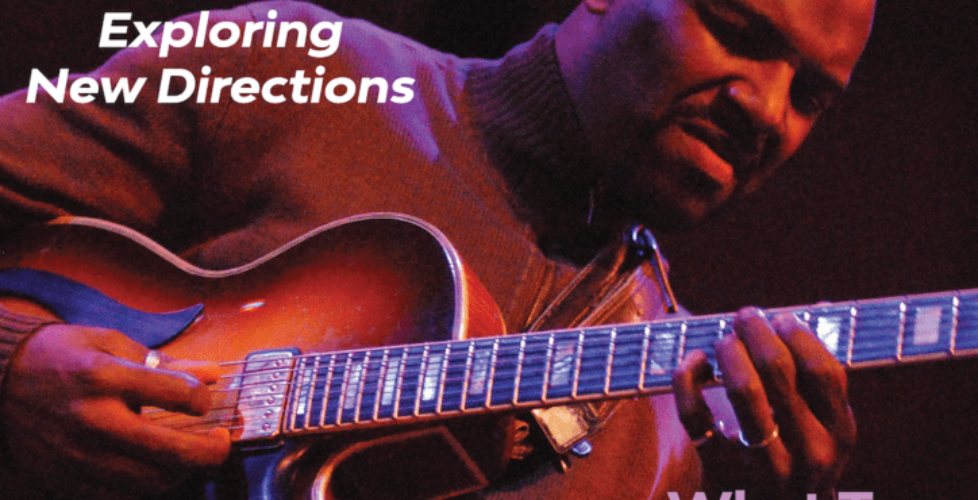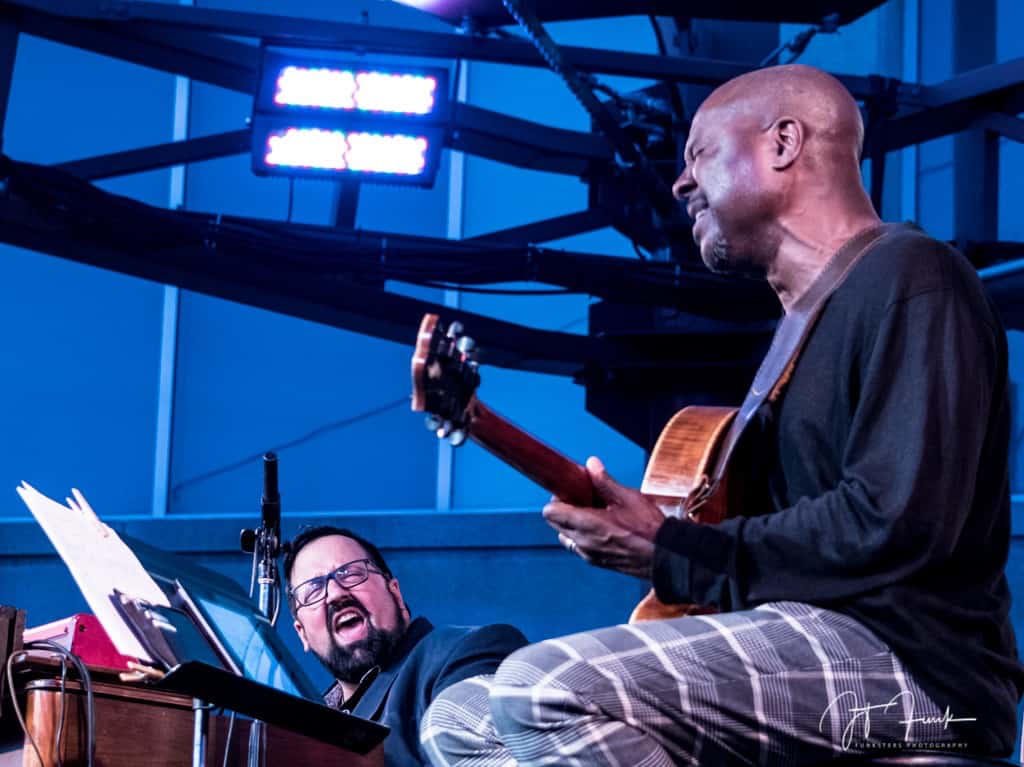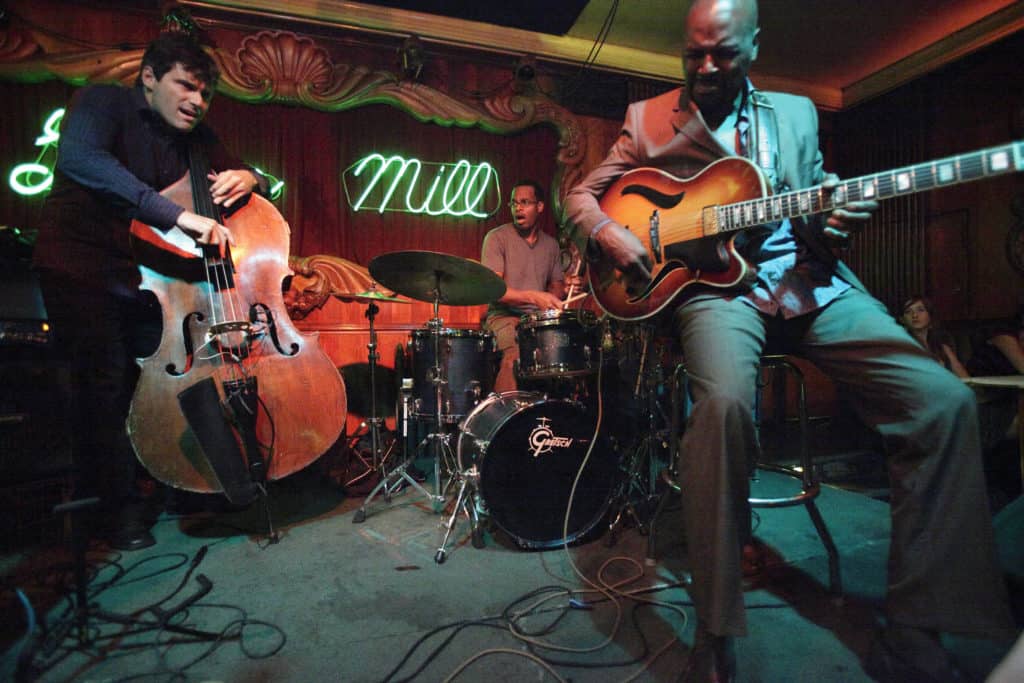Jazz Guitar Today: Bobby Broom Explores New Directions

Jazz Guitar Today talks to the legendary jazz guitarist Bobby Broom about his journey, and about the ‘new direction’ of his current project.
Bobby Broom has done it all. He’s earned the respect of players all over the world. He’s earned his place in academia and is a renowned educator. But Bobby is not content with that and his drive and passion keep pushing him in new directions. Bobby is working on a project with a new sonic landscape for which we at JGT applaud. In this interview, we salute Bobby. His accomplishments and new directions to expand his palette of self-expression. Enjoy our salute to Bobby Broom.

Bob Bakert, JGT editor: We discussed ‘new directions’, what can you tell us about your new project?
Bobby Broom: The new record I’m working on is a bit of a turn from my past recordings, meaning, the trio-based, jazz records with a traditional slant. My last record (“Soul Fingers”) was a bit of a step away from that, in that I added additional sounds – horns, strings, percussion – to supplement various tunes. This record, however, is totally different. First of all, it’s electronic-based. We (drummer/producer/composer, Poogie Bell and me) are using sampled sounds and loops as the basis for composition and often the rhythm of the music. Those sounds are then being enhanced by real musicians and instruments– drums, bass, piano, keyboards and a variety of instrumental soloists.
As far as the musical style(s) involved, I assume that jazz-heads (of which I’m one), will question if this is Jazz. The answer is probably yes, but not your grandfather’s Jazz. The title of the record, “Bloodlines,” refers to the undercurrent, or strain that can be found in all musical styles rooted in the African American diaspora. Many of our jazz greats, Duke Ellington, Max Roach, Miles Davis, Nicholas Payton, etc. have bemoaned that word, Jazz. I’m not trying to start a debate, but I do understand the issue(s). But I’m not ready to release that title’s musical association because of the devotion of all of the lives that were involved in making for the creation of the music and to develop, evolve and preserve its integrity. So much hardship went into it, so to call it something else now, after all that, seems like giving up way too much. I also agree though, that clarity needs to be established around what jazz is, or maybe more importantly, what it isn’t. Who decides that is really closer to the real issue, I believe. Many of us musicians who are playing it don’t really need to call it anything in particular, we’re just playing what we feel. It can take on different guises, as long as it contains certain elements and features, and can still be considered Jazz as far as we’re concerned. But I suspect that certain people, critics, certain types of musicians (professionals or amateurs on group threads), need the name for their own reasons. Those same people may be turned off by my new music because of the various beats, the blues and frankly just how Black the music is. That is, if they even care to pay attention to it at all. I’ve encountered my fair share of that in my career as well. LOL
Because I came up in the 70s, I was fortunate to benefit from hearing top 40 radio which was not segregated or compartmentalized at that time. So a hit song could be in country, soul or R&B, soft rock, hard rock, jazzy big band, doo-wop, bubble-gum, or whatever style. Melody was still very important, as was an artist’s performance – meaning how they sold the song with their interpretation, the attractiveness of their musical voice, etc. Songwriting was still substantive – not that it isn’t anymore, but that’s not what’s being marketed as Pop music anymore – there was still song form and harmonic movement. The great American songbook or Tin Pan Alley style of songwriting was still influential in popular music in the 70s. Saying that to say that I heard a lot of music. Melodies, harmony, hooks, bass lines, instrumental sections and ornamental embellishments… I was paying close attention to all of it, so by the time I heard jazz, all those melodies that they were playing over the chords made some kind of innate sense to me immediately. Of course, I had to get the specific language together and understand everything from a jazz music perspective… and learn how to play my guitar… LOL. But that’s why I play a lot of those pop songs. Because of what they meant and mean in my life.

What I like about the new record is that I’m getting to do something else that I really want to do and I hope some people like it. Hell, I recorded “Monday, Monday” by the Mamas and Papas! So obviously I’m okay with taking chances. So now I’m playing and paying homage to certain other stylistic feelings that influenced my musical aesthetic. We’ve got a song on there that sounds borderline disco, or like it could be played for roller-skaters. Really it’s more like a steppers tune, like – for the sake of reference – an R. Kelly type thing. But folks are going to hear it the way they hear it (or not at all) and say whatever they want to say about it. The other cool thing is that I’m trying to use many of the active and important voices that I’ve connected with in one way or another during my time in Chicago. So, this music links Jazz to its roots and all of its various offshoots through a jazz guitar voice that has absorbed or borrowed from all of it and realizes the significance of those connections. For all those reasons I thought Bloodlines was a good title.
Because I did different things and went in different directions during my career – like choosing to play “jazz-funk” (with GRP Records, Tom Browne, Omar Hakim, Marcus Miller, Victor Bailey, etc.) rather than joining Art Blakey and the Jazz Messengers for example, or by making my own debut record for GRP, moving from NYC to Chicago, or playing with Dr. John, Hugh Masekela… or on the track for one of R. Kelly’s hits – when I finally had the opportunity to try to establish myself as the jazz guitarist that I know am and always have been, despite what other work I’d done, I feel that I had to kind of force the issue. I mean that I had to establish a significant body of work with my guitar trio records and my organ trio records. I had to establish my voice by releasing on a regular basis, and thankfully I was getting good air-play with all those records, which meant that the many jazz fans that listen to jazz radio across the nation hear(d) me, liked my sound and what I was doing. Although I’m not a chosen jazz figure, I have been able to hand-craft a respectable reputation as a jazz guitarist because of the relative success of those recordings.
Below are some text excerpts from the JGT interview – for the full interview, check out the video.
On playing with all the incredible musicians over the years…
Yes, I feel very blessed. I feel very blessed to see that list. Sometimes it’s like, Whoa, really That, that happened. I mean, I know it’s there, but man… I remember practicing as a kid in my room in New York. I had a bunch of records by then and I was hell-bent on being one of those guys. This is what I wanted to do. And then one day it dawned on me, I was in my room practicing and the thought hit me. Dude, you’re not going to do that because these guys are already adults and they’re doing it. And you’re 15. You’re not, you were born too late. Not knowing really about how the music works and the mentoring and apprenticeship that’s involved – and how the music is passed through generations. I didn’t, I wasn’t thinking of all that. I was just thinking like a kid, and it was upsetting to me, but then I thought, I don’t care. I’m just gonna do it. I love this music so much. I’m just going to practice. I just want to learn how to play. So if there’s a way or like an imaginary kind of membership to this jazz thing, I want to be eligible! And I don’t care what happens.

Favorite formats to play…
I can’t really say, I know solo guitar is not one of my favorite things. I appreciate it when I do it – and it turns out halfway decent, I enjoy engaging and interacting with other musicians. And, the trio setting has just been something that kind of happened over the years. I wanted to have a guitar trio without another harmonic instrument and that just evolved over time and a bunch of recordings. So that’s that, so the organ thing is kind of in the blood – and in the lineage of jazz guitar.

Pursuing a master’s degree…
When I first started teaching I wasn’t a capitalist. So I didn’t accept the offer from Jackie McLean to head to the Guitar program at the University of Hartford. I was 22 years old, had no degree and had never taught (other than that first year for him). If it wasn’t for my integrity I’d be retired by now! But I continue to teach…

On his position Northern Illinois University…
I arrived at the situation, which is, a blessing. It was honest, it was not calculated. It was just a part of the gift. I’ve been gifted a lot in this life. And this is another one of those situations where it couldn’t have happened at a better institution at a better time. I feel like, I always dreamt that I would find a place. Well, I didn’t know that I would, but I wanted a place where I could be myself. Where I could be a practicing jazz musician and would be supported in that. Like where does that exist? I don’t know of too many…I don’t know of too many institutions in academia where that is actually the case.
